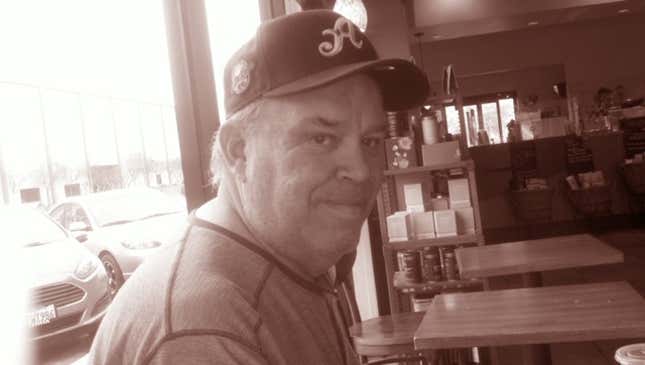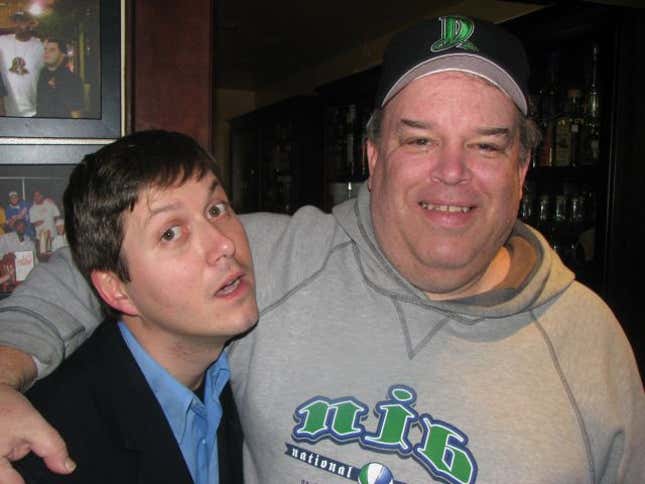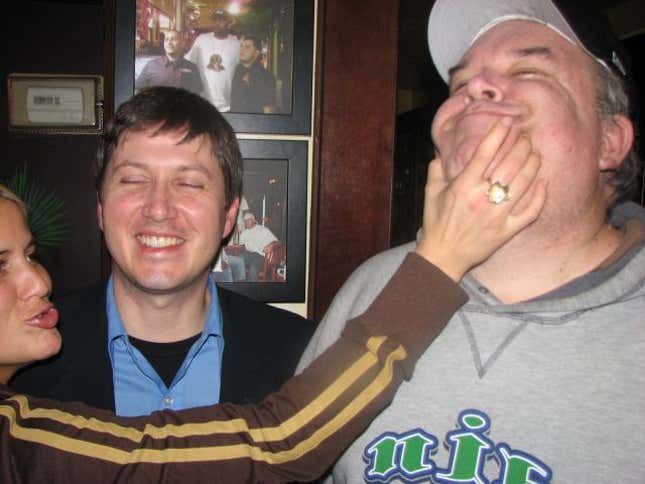
Will Leitch is the founder of Deadspin, and for the first year of this site’s existence, there were only two bylines: His and Rick Chandler’s. Rick has been hospitalized since a stroke last month, and he had another stroke on Friday that, according to his sister, “has left Rick in a non-responsive state.” The family has thus “made the very painful and difficult - yet humanitarian - decision to let Rick pass.” There’s a GoFundMe set up to help with Rick’s medical bills and his ailing mother, for whom Rick was the primary caregiver.
The following essay ran in Leitch’s weekly newsletter last week and is reprinted here.
My old friend and longtime Deadspin colleague Rick Chandler suffered a stroke at the beginning of this month. According to his sister and his friend Sam Player—who informed me of Rick’s illness by sending an email to “[email protected];” thanks to Samer Kalaf and Tommy Craggs for making sure I knew—it was a “significant” stroke. He went out to get gas one morning, had a stroke, hit his head on the ground and then there it is, that’s how it happens, just like that.
I have known Rick for more than 20 years. It is strange to be old enough to know someone that you didn’t grow up with for 20 years. Rick might have been the first person I ever met by Internet byline. He was friends and associates with my old colleague Andy Wang, whom I worked with way back in 1998 at The Sporting News Online. Andy and I didn’t have much in common, but we instantly recognized each other as ambitious for more than just working the night shift in an office park in Creve Coeur, Missouri, and when he saw my non-work email address was “[email protected]” (I know, I know), he asked if I want to write about movies for his independent journalism site Ironminds.com. There wasn’t much on the planet I wanted more than that—I hadn’t written anything longer than an AOL headline since I started working at TSN—so I wrote for him so often and so obsessively that I basically ended up running the site with him. But there was another guy there, based out in California, named Rick Chandler, who was clearly the site’s star. Rick was funny and he was smart, but there was also something ... kind about his writing. He was a gentle satirist, more Will Rogers than Mort Sahl. He made you laugh without feeling bad about it. I hadn’t seen that on the Internet before, and frankly I haven’t seen it much since.
I can’t describe Rick’s humor any better than I did in a tribute to him when he left Deadspin in 2009.
He was naturally funny in a way I wasn’t: He was funny without having to sweat at it. He also came at the world in a way I appreciated, and in a way I thought the site would need: He liked to poke fun at humans, but he didn’t like to mock them. Rick was incapable of being mean; he was always too busy giggling. I wanted that for the site – because I knew, no matter how nice we were, people were going to accuse us of being cruel Internet scum, so I wanted someone who was the literal opposite – but mostly I just wanted to be a part of something Rick was doing. Rick makes me laugh very, very hard. Those are nice people to have around.
Ironminds eventually moved to New York City, and I moved along with it. Rick stayed in California, but I met him for the first time with Andy in 2000. I hadn’t realized he was older than me, though back then, “older” was a vague term that basically classified most of humanity. He was friendly but quiet, shy; we ended up spending a day with Mary Jo Pehl, the Mystery Science Theatre 3000 writer, and Rick, who loved the show, was so nervous around her he could barely speak. He wasn’t a young twentysomething kid desperate to take over the world like us. He just liked jokes. I got the sense he was being nice but really just wanted to go back to his computer and start writing some gags.
I always made sure to keep Rick close, though; he wrote a piece about Dennis Miller for The Black Table back in 2003 that was one of our biggest hits at the time. And when my pitch for a funny sports site somehow persuaded Nick Denton, Lockhart Steele and the Gawker folk to make such a thing, and after Bill Simmons and Dan Shanoff and basically every other ESPN Page 2 name at the time turned down Gawker’s offers to make them the site lead and have me be their assistant, they put me in charge. (I was cheap and hungry.) I wanted my associate editor to be someone who was reliably funny, good-hearted and, if I’m being honest, modest enough not to challenge my authority about precisely what I wanted the site to be. I was a control freak about Deadspin. I cared about the site when I was running it more than I cared about anything else in the world, to my detriment and often the detriment of people around me. One of the reasons I ultimately left was my increasing inability to resemble a normal human being while running it. Rick’s fundamental decency, and his way of being unimpressed by all the things that surrounded Deadspin other than just making a smart, goofy site, kept me as grounded and level as possible. (Which was, alas, still not that grounded and level.)
Rick was perfect. The site launched in September 2005, but we started working on a practice site in March 2005, which means for basically six months, the site was just me and Rick competing to make each other laugh. He always won.

The site ended up taking off, as you might have heard, but Rick remained steady, writing his 5-6 posts a day and staying out of the way for me to do everything else. He was nonetheless responsible for many of the site’s biggest hits. It was him, not me, who had the first “You’re With Me, Leather” post. (We had no idea that was going to explode like that.) His Barbaro posts were always sharper and goofier than mine. And he always made sure the site remained, at its core, silly. I was so ambitious, and so overwhelmed by how big the site got so fast, that I would have been willing to do just about anything to make sure the site succeeded had I not been kept in check in part by Rick. Rick always reminded me why we were there in the first place. He always reminded me none of this was supposed to be taken all that seriously. This place never would have survived without him.
For what it’s worth: I never actually saw Rick during any of this time. I’d wake up in the morning, his posts would already be in the CMS, I’d schedule them for sometime later in the day, and then I’d write like an idiot until 5 p.m., when I’d email him whatever stories I never got around to writing about. We were on entirely different schedules, and we rarely even talked. We didn’t need to: We were both on the same page. During all of Deadspin’s run together, I only physically saw him once. It was during the God Save the Fan book tour, when we did a stop in San Francisco. Rick was a figure of mystery to most of Deadspin’s readers, and when we all went out to a bar after the reading, everyone was desperate to meet him. My sister lived out there at the time, and she was instantly drawn to him. She told me that night he might be the sweetest man she’d ever met.

It ended, because everything always ends. I left for New York magazine in June 2008, and Rick stayed on under the truly-astounding-in-retrospect tag team of A.J. Daulerio and Clay Travis, and once A.J. got Clay the hell out of there, Rick stuck around. But Rick and A.J. were a less logical team than Rick and me—and A.J. was going to have to make changes on the site that were desperately needed for it to survive and thrive; as I’ve written before, Deadspin would have died within a year if A.J. hadn’t made it what he did—and Rick ultimately left. Rick had considerable hard feelings about the end of his time at Deadspin, which has always saddened me, even if I felt many of his criticisms of A.J. were unfair and even a little unkind. But the readers always loved him, and you always knew his heart was in the right place. I haven’t seen him in many years, but we still email semi-regularly and make sure each other are OK. Rick is the only person who would think to email me that the 40th anniversary of Love and Death was coming ... in two months.

Rick has lived a fascinating life. There was always some sort of odd bit of Rick trivia that would sneak out in casual conversation. My favorite is that he was Tom Brady’s youth basketball coach. (“The man who replaced Drew Bledsoe couldn’t, in his freshman year, rise above Kevin Krystofiak (currently a local insurance broker) on the depth chart.”) You always had to stumble across these bits about Rick. He never offered them himself. I always meant to just sit him down and ask him everything I was always curious about. I had no doubt there were thousands of stories, if I could just get to them.
And now this.
When you are young, serious illness and death are abstractions, aberrations, background rarities that are disruptions of the natural order. As you get older, they creep in around the edges. It’s not grandparents and great-grandparents anymore; it’s old schoolteachers, and sports heroes from your childhood, and uncles, and parents of your friends. It becomes high school classmates, and friends you used to go out drinking with, and then old work bosses and colleagues, and then friends. I know that this is the natural order of the world, that this is just how it goes. That doesn’t make it easier. In his titanic essay “This Old Man,” Roger Angell wrote about growing older and watching people you care about ... not grow older.
We geezers carry about a bulging directory of dead husbands or wives, children, parents, lovers, brothers and sisters, dentists and shrinks, office sidekicks, summer neighbors, classmates, and bosses, all once entirely familiar to us and seen as part of the safe landscape of the day. It’s no wonder we’re a bit bent. The surprise, for me, is that the accruing weight of these departures doesn’t bury us, and that even the pain of an almost unbearable loss gives way quite quickly to something more distant but still stubbornly gleaming. The dead have departed, but gestures and glances and tones of voice of theirs, even scraps of clothing—that pale-yellow Saks scarf—reappear unexpectedly, along with accompanying touches of sweetness or irritation.
This feeling, this sense that someone who has been a considerable part of your life suddenly no longer being there for you to say all the things you want to say to them ... it will only grow. Rick is my friend, and I care for him, and my life is better and more full because it has had him in it. I’m only saying this to him now, and only because this has happened. There are many others in my life who I want to say this to, and who, unlike Rick, can hear me and respond. I could do it right now. I should just go out there and say it. Maybe we all should.
Will Leitch is the founder of Deadspin.